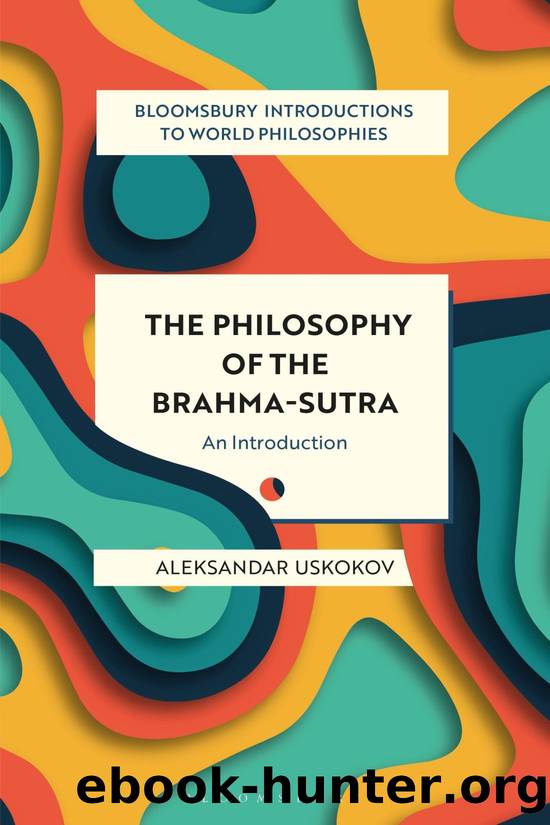The Philosophy of the Brahma-sutra by Aleksandar Uskokov;

Author:Aleksandar Uskokov;
Language: eng
Format: epub
ISBN: 9781350150034
Publisher: Bloomsbury UK (Minor Textbooks)
Published: 2022-06-29T00:00:00+00:00
The Soul as Agent
It is apposite here before we continue with karma to pay one debt to Chapter 3 and briefly discuss BÄdarÄyaá¹aâs heading on the soulâs characteristic of agency.21 The background is again that of SÄá¹ khya, where the soul is said to be an agent of experience, specifically of karma, but not of action. The underlying SÄá¹ khya concern is soteriologicalâan essentially active soul could never become free of karmaâbut there is a soteriological price to pay as well. If the soul is not an agent, then it cannot exercise free will. How can, then, it ever become liberated? The SÄá¹ khya reply is given in SÄá¹ khya-kÄrikÄ 62: the soul does not become liberated, because it was never bound to begin with. It is only prime matter that binds and liberates itself. Even the soulâs agency of experience is agency just âin a manner of speaking,â because the soul is in mere proximity and not true union with prime matter.
The SÄá¹ khya argument is bolstered by strong references, adduced by the commentators in presenting the prima facie view, from no less authoritative source than the Bhagavad-gÄ«tÄ, which says that it is the modes or guá¹as of prime matter that act, whereas the soul is merely the enjoyer of happiness and suffering, that is, of karma.22
There is again a major disagreement in the interpretation of the adhikaraá¹a, and Åaá¹ kara and BhÄskara implicitly endorse the SÄá¹ khya view, making the entire adhikaraá¹a a prima facie view as it were. Their interpretation can be right only if their understanding of embodiment and liberation are shared by BÄdarÄyaá¹a. We have seen how they are on their own with respect to the first, and in Chapter 7 a similar story will emerge with respect to the second. We side, therefore, with NimbÄrka and RÄmÄnuja.
BÄdarÄyaá¹aâs argument about the soulâs agency is theological, and its core is that for scriptural injunctions to make sense, the soul must be the agent, and the agent of action and experience must be identical.23 This is based on a principle stated in MÄ«mÄá¹sÄ-sÅ«tra: âThe result of undertaking scripturally enjoined action belongs to the undertaker.â24 In BÄdarÄyaá¹aâs context, the principle specifically pertains to the attainment of samÄdhi or meditative absorption in which the vision of Brahman, whereupon liberation is consequent, obtains. If the soul has no agency in the meditative act, then it would not be entitled to the results of samÄdhi either.25
As we have seen earlier, the soul is not the only agent, and BÄdarÄyaá¹a again affirms Brahmanâs crucial role: â[The agency of the soul], however, [comes] from the Supreme, because there are scriptural texts [to this effect].â26 The texts identified by the commentators are those which we have seen in the case of Brahmanâs causative agency in the experience of karma, and similar dependence is stated here as well: not only does Brahman depend on karma in the domain of experience, but he also depends on the effort of the soul as the primary agent with respect to action, for otherwise injunctions and prohibitions would be useless.
Download
This site does not store any files on its server. We only index and link to content provided by other sites. Please contact the content providers to delete copyright contents if any and email us, we'll remove relevant links or contents immediately.
| Bhagavad Gita | Upanishads |
| Vedas |
Fingersmith by Sarah Waters(2019)
Kundalini by Gopi Krishna(1829)
The Bhagavad Gita by Bibek Debroy(1668)
Indian Mythology by Devdutt Pattanaik(1626)
Wheels of Life by Anodea Judith(1616)
The Yoga of Jesus: Understanding the Hidden Teachings of the Gospels by Paramahansa Yogananda(1534)
The Man from the Egg by Sudha Murty(1503)
Autobiography of a Yogi (Complete Edition) by Yogananda Paramahansa(1492)
Chakra Mantra Magick by Kadmon Baal(1388)
The Book of Secrets: 112 Meditations to Discover the Mystery Within by Osho(1359)
Avatar of Night by Tal Brooke(1258)
The Sparsholt Affair by Alan Hollinghurst(1248)
Sparks of Divinity by B. K. S. Iyengar(1231)
Karma-Yoga and Bhakti-Yoga by Swami Vivekananda(1224)
The Bhagavad Gita (Classics of Indian Spirituality) by Eknath Easwaran(1209)
Gandhi by Ramachandra Guha(1199)
The Spiritual Teaching of Ramana Maharshi by Ramana Maharshi(1175)
Skanda Purana (Great Epics of India: Puranas Book 13) by Bibek Debroy & Dipavali Debroy(1140)
Hinduism: A Very Short Introduction (Very Short Introductions) by Knott Kim(1123)
